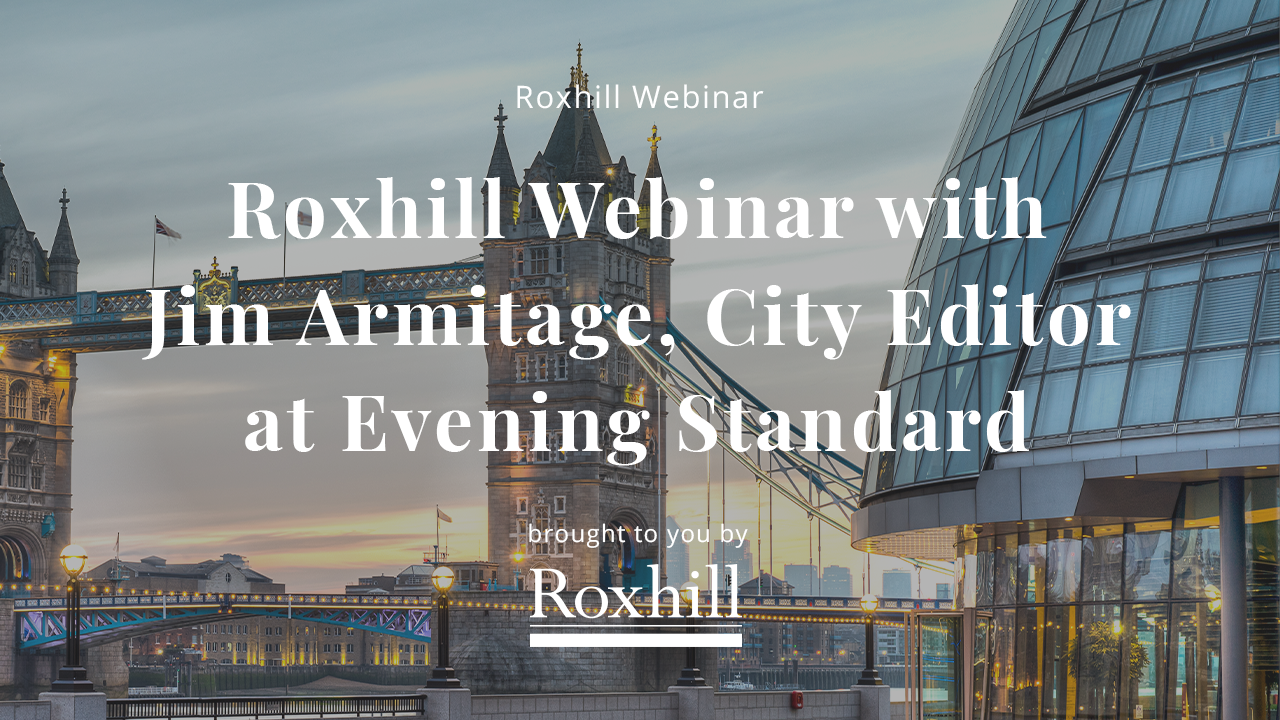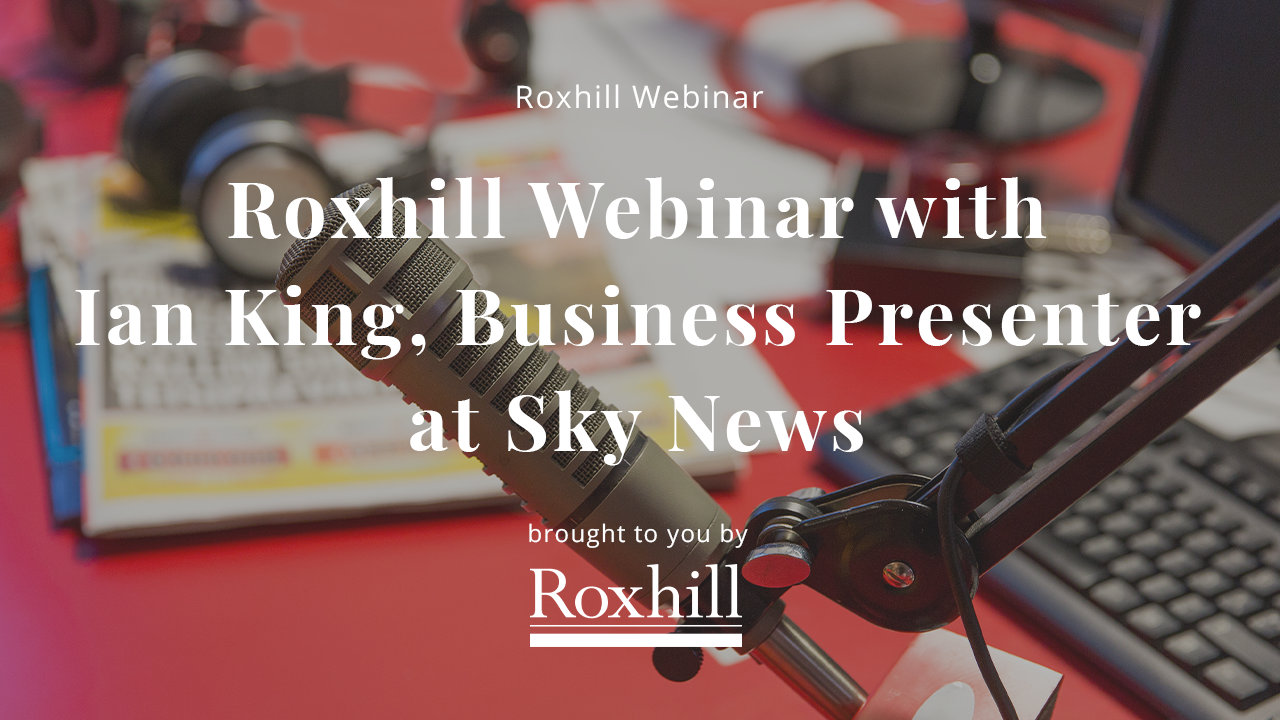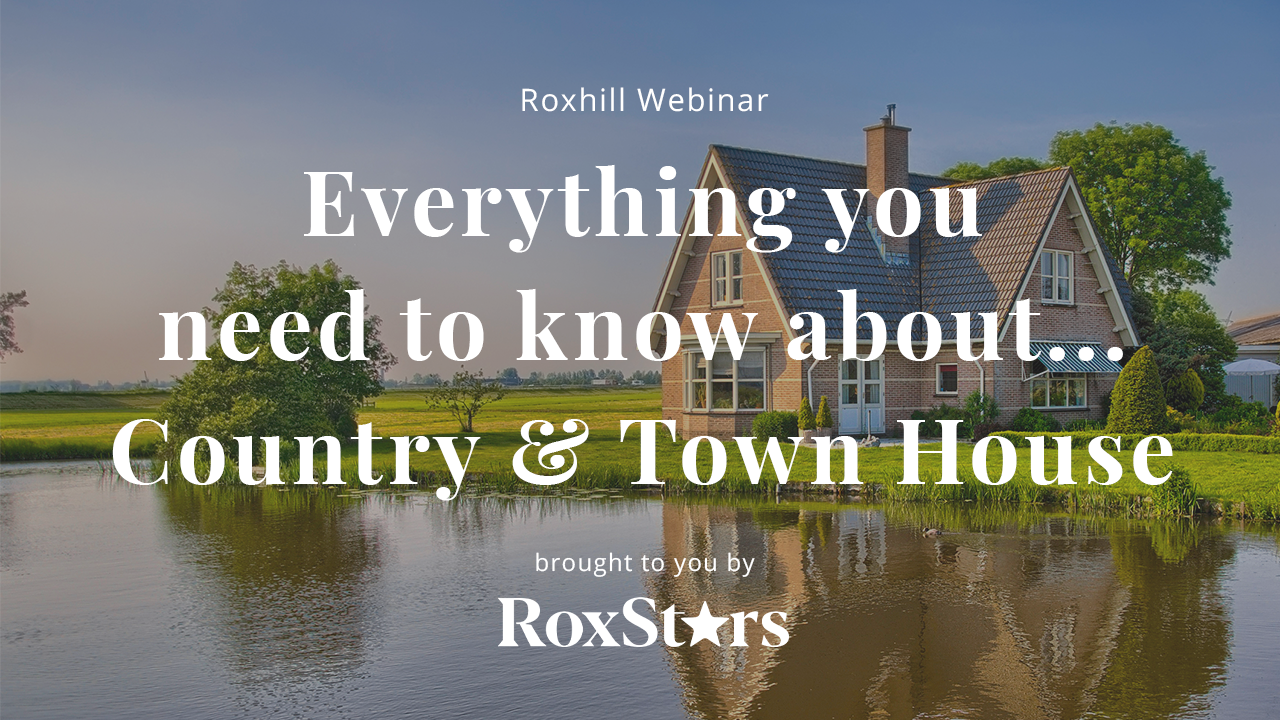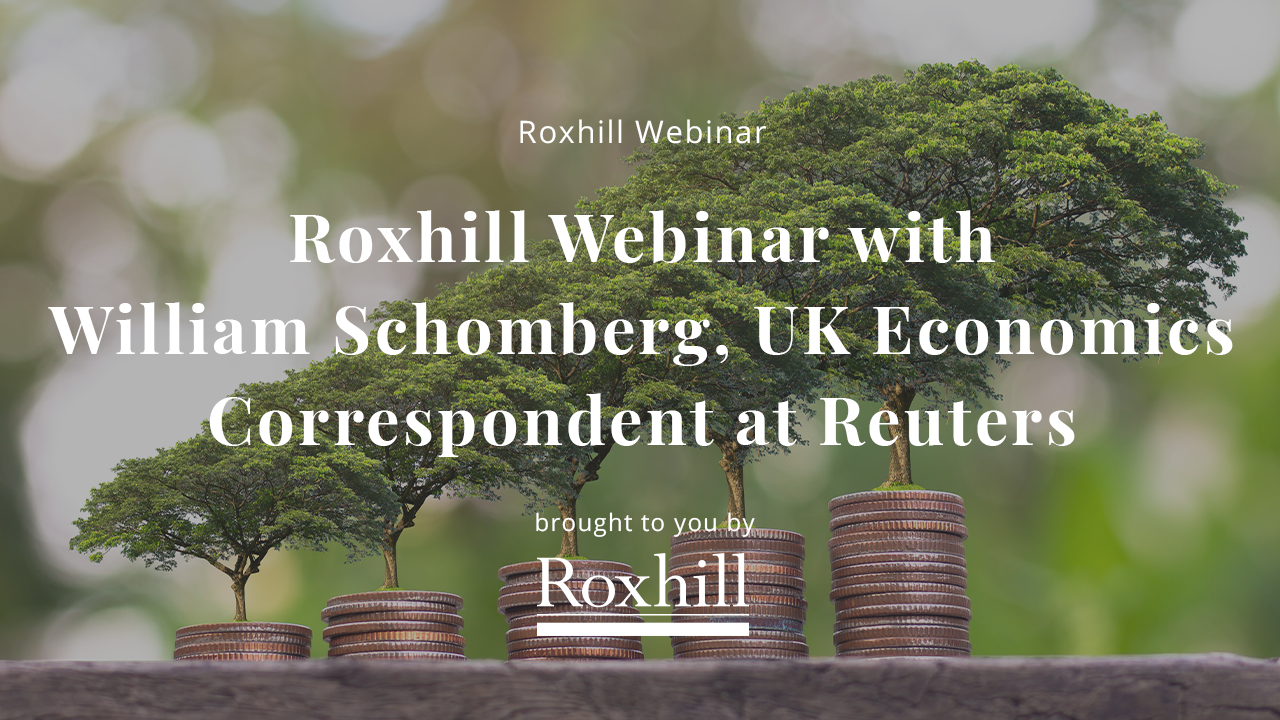Roxhill Webinar with Jim Armitage, City Editor at the Evening Standard
Watch our webinar with Jim Armitage - City Editor at the Evening Standard, for a discussion on the challenges faced during lockdown and how the crisis is impacting the business news agenda.
Roxhill Webinar with Ian King, Business Presenter at Sky News
Watch our webinar with Ian King - business presenter at Sky News and host of Ian King Live for a discussion on the challenges of producing live television during lockdown and how the crisis is impacting the business news agenda.
Roxhill Webinar: Everything you need to know about… GQ
Catch up on our webinar with Paul Henderson, associate editor of GQ, to find out what Paul’s team are currently working on, the slots and pages they need your help with now, and how best to get their attention.
Roxhill Webinar: Everything you need to know about… Country & Town House Magazine
Catch up on our webinar with Lucy Cleland, editor of Country & Town House magazine, to find out what her team are currently working on, the slots and pages they need your help with now, and how best to get their attention.
How to build a business press list in 30 seconds
Build your press list with ease.
Roxhill enables PRs to efficiently build targeted, topic-based media lists in just 3 simple steps. Your data will be refreshed and updated daily by our team ensuring you reach the right journalists every time. Watch the video below to see how easily you can build your lists with Roxhill.
How to build a financial press list in 30 seconds
Build your press list with ease.
Roxhill enables PRs to efficiently build targeted, topic-based media lists in just 3 simple steps. Your data will be refreshed and updated daily by our team ensuring you reach the right journalists every time. Watch the video below to see how easily you can build your lists with Roxhill.
Roxhill Webinar: Everything you need to know about… Red Magazine
Catch up on our webinar with Sarah Tomczak, editor of Red magazine, to find out what her team are currently working on, the slots and pages they need your help with now, and how best to get their attention.
Roxhill Webinar with William Schomberg, UK Economics Correspondent at Reuters
Watch our webinar with William Schomberg - UK Economics Correspondent at Reuters, for a discussion on how his team are responding to the challenge of lockdown and how the crisis is impacting the business news agenda.
Roxhill Webinar: Everything you need to know about… Stylist Magazine
Understanding what a publication is aiming to do and how it runs is the first step to pitching its editors successfully. In the first of our new series of events, we were joined by Stylist’s Editor in Chief Lisa Smosarski to give us the inside view on how the magazine works and the type stories they are working on now. Catch up on the webinar below.
In our recent webinar we asked leading travel experts to discuss their thoughts on the challenges facing the industry and whether Covid-19 could actually be an opportunity to make a serious impact on carbon emissions.
Isabel Choat - online travel editor at The Guardian, Chris Haslam - chief travel writer at the Sunday Times, Anna Hughes - author and founder of Flight Free UK share their insights below.
1. What do you think the agenda will be once Covid is calmer and we all start to think about travelling again, will we go back to our old ways?
Isabel Choat
I think this pause in travel has almost accelerated the conversation and given some more impetus to discussions and concerns that were already there. I don’t think it’s necessarily changed the agenda, but it’s allowed people to intensify their focus on it.
There’s never been a time before and hopefully there won’t be a time again when people are actually looking at, for example, totally empty cities, no planes in the sky and less pollution. I think it has put the issue into, not necessarily the spotlight, but it’s definitely given some impetus to it. The people who were already looking at these issues and finding new ways of doing tourism in places like Barcelona and Venice, will want to keep the momentum going.
The big question is, we just don’t know how or when things are going to return to some kind of normality and what that means. So, I don’t think it has necessarily changed the conversation, it has just intensified it if anything.
Chris Haslam
I think that the will was there, back in January everybody was realising that sustainability was the way forward, reducing flying was the way forward. But I think the Covid-19 crisis has really put the brakes on the progression of sustainability. It’s just down to money, these companies have been haemorrhaging cash over the last few months, up to £20 million a day in some cases, which is staggering. They need to get money back, sustainability initiatives cost money, they cost money to develop, they’re all based on circularity.
In the short-term companies are likely just going to forget the sustainability, they’ll just be trying to get people back in the hotels, getting money back in the bank and then they will be able to readdress this later down the line. That being said, that goes against public desire to become more sustainable in general so there will be concessions made, but I think there may be a little bit of window dressing in the short-term, a little bit of showbiz towards the sustainability without the real deep changes that are needed. I think in longer-term, once people start flying and revenue starts flowing in again, it will come back as a main focus, but at the moment it’s not the priority.
Anna Hughes
So, will we go back to our old ways? I hope that we will change things, we campaigned for general reduction in aviation for the benefit of the environment and also for the benefit of the traveller. The Flight Free 2020 Pledge was about asking people to choose to travel by other means, in ways that are less impactful upon the environment and of course no travel has been possible at the moment.
For some people, they will have discovered that actually staying still is ok, but for many people they’ll just be desperate to get out and that is completely natural. We love to travel. It’s sold to us as something that is really good for us and to be able to choose to do it in a way that is sustainable is a luxury. I think from the point of view of the campaign, I do fear that once flights are back on the table people will be booking them with a vengeance to make up for lost time. So the challenge here is to keep that message going because I think forgetting sustainability just to get the travel industry back up and running, is going to be quite common across the board. When actually, sustainability is hugely important because while the Coronavirus is going on, the climate crisis hasn’t gone away. We still desperately need to be having these conversations and taking necessary actions.
2. With regards to the recent story in the Guardian about somewhere like Venice looking so beautiful and untouched by the complete lack of tourism, how will they revisit this whole thing?
Presumably they really like not having the massive cruise ships coming in and not having the huge amounts of tourists there, will they perhaps start charging? What route do you think they will take?
Isabel Choat
They were already looking at it but there was a huge conflict in Venice between the people who want their city back and want to reduce over-tourism versus and the economic benefit big cruise ships bring in. Venice was already trying to address the issue, so I think they’ll pick that back up.
It’s really challenging because there are places like Venice and Barcelona where people are happy to have the city back to themselves, but equally most people are saying they don’t want the city like this, completely empty and devoid of tourists. It’s not that they don’t want any tourists, the problem seems to be that whilst there is a really strong desire to address the issues, no one is really coming up with any firm strategies to deal with it.
I think what Chris said about sustainability being a luxury at the moment and companies not being able to afford it is true, but I think there’s still a huge desire on the part of destinations. I think destinations will put increasing pressure on companies, whether it’s hotels or modes of transport within cities or destinations to improve their eco-credentials.
3. Do you think the dangers of travelling and the risk of contracting Coronavirus in the next few months will cause people not to travel more, rather than the desire to save the planet?
Chris Haslam
If you look at all the polls, they’re all showing that there’s a minority of people who are willing to fly right now, I am in that minority - I wouldn’t hesitate. That being said, it will stop people travelling but I think we’ve got to think beyond 2020 and look into 2021.
I think one of the factors in favour of the continuation of sustainable practices in tourism is going to be the tourist experience this summer because when people fly off to the Med on their Jet2 or their TUI they’re still going to find the landscape completely changed. I think when you see Covid mitigation measures put in place in a 300-room all-inclusive hotel, the inhumanity of that structure will suddenly become apparent. The utter unnaturalness of these concrete blocks will become apparent and once you remove the humanity and put people behind masks and separate plastic screens between the tables and such like that, it’s going to look much more unattractive than it did last year.
Many people I think are going to start thinking there must be something else, the problem is they don’t know what it is, they don’t know about these eco-resorts in southern Spain, for example. I think that’s the challenge for marketing and for PR companies, to make people aware that an alternative exists, but it’s not going to happen this summer. We’re going to have to wait for people to go to hotels, become disenchanted with the old model and start looking for something new, before they start reading that message.
4. Do you see PRs starting to approach you with sustainable stories now or does it feel like we should marry up Covid issues with sustainability? And are you getting approached already by PRs about this issue going forwards?
Isabel Choat
I haven’t had a lot of emails about it from PRs, obviously we already have a huge focus on sustainability and green travel. We became effectively a no-fly section last autumn. We always have a huge focus on the UK and that’s grown over the last year, since we became no fly. So much of what we’ve been doing recently has been focused on the crisis and new stories and initially for the first eight to ten weeks, armchair travel, we weren’t really running stories about sustainability, mainly because we weren’t really running normal travel stories at all. But of course, we’ll pick it up where we left it and I think it’ll be even more important because of the sort of things we’re discussing now about whether or not people will be desperate to jump on a plane. So we’re not getting a lot through on it at the moment, but we will continue with what we were doing before this crisis.
We have run stories about European destinations, but they’ve been much more atmospheric evocative stories, “I wish I was there” type piece rather than a call to go there. We’ve done a few UK pieces in the last couple of weeks with places opening up from July 4th. We’ve got plans for a lot more UK stories, so we’re just shifting now into focusing on stories which will be your more standard travel piece. From July, journalists will be able to travel so we will be sending people within the UK to cover stories.
5. Anna, do you think it’s bad that the government haven’t held the airlines to account in the same way the French government have made AirFrance commit to green targets?
Anna Hughes
So FlightFree UK was one of the cosignatories on a letter from Greenpeace which said bailouts need to come with green conditions, like what they’ve done with AirFrance. One of the things I really like that they’ve done in France, is they’ve reduced the number of flights on route where a direct train exists and that makes perfect sense. But again, in the short term, we’re not travelling by train so what do we do? Is this only for commuting? Is the non-essential travel by train only supposed to apply to commuter trains or does it also apply for holiday? Can we go on the Caledonian sleeper for example? And how is that worse than travelling by air?
6. Chris, do you think the airlines have a responsibility to consider the new routes that they’re planning through a sustainable lens and think about distributing tourists across more around the planet to avoid over-tourism?
Chris Haslam
It’s not going to happen in the short-term because routes are being abandoned daily, the world is becoming a much, much smaller place and this is a worry in terms of over-tourism, because when we have thousands of destinations being reduced to hundreds of destinations, it means people will be concentrated on the routes that pay the most. This is really bad.
I visited a beautiful eco-lodge in Nicaragua last year, and the only reason I was there was because there was a new direct flight to Nicaragua, that’s why I got sent over to cover it. That flight is gone, that won’t get any traffic and that initiative that was put together has gone. You can multiply that across the world in remote places where pioneers of sustainability have started showing the big businesses how to do it and how to make it profitable, they’re going to be cut off at the knee. Then we’ll be back to the homogenisation in the big resorts. If you just look at Spain for example and take out some low paying destinations in not very popular routes e.g. Jerez, Zaragoza, Reus, you then end up with the main routes being Barcelona, Madrid, Malaga, Valencia and that is where the public will go. That is where investment will then go because that is where the tourists are arriving and it’s a massive blow for tourism, for sustainability.
In terms of airlines, the EU has agreed to allow airlines to wriggle out of paying for their emissions until 2024. So that means of control is gone, and it just comes back to the argument that it’s business that comes first, it’s getting revenue before saving the planet. It will come back but it’s not going to happen this year and in terms of aviation, probably not for 5 years.









